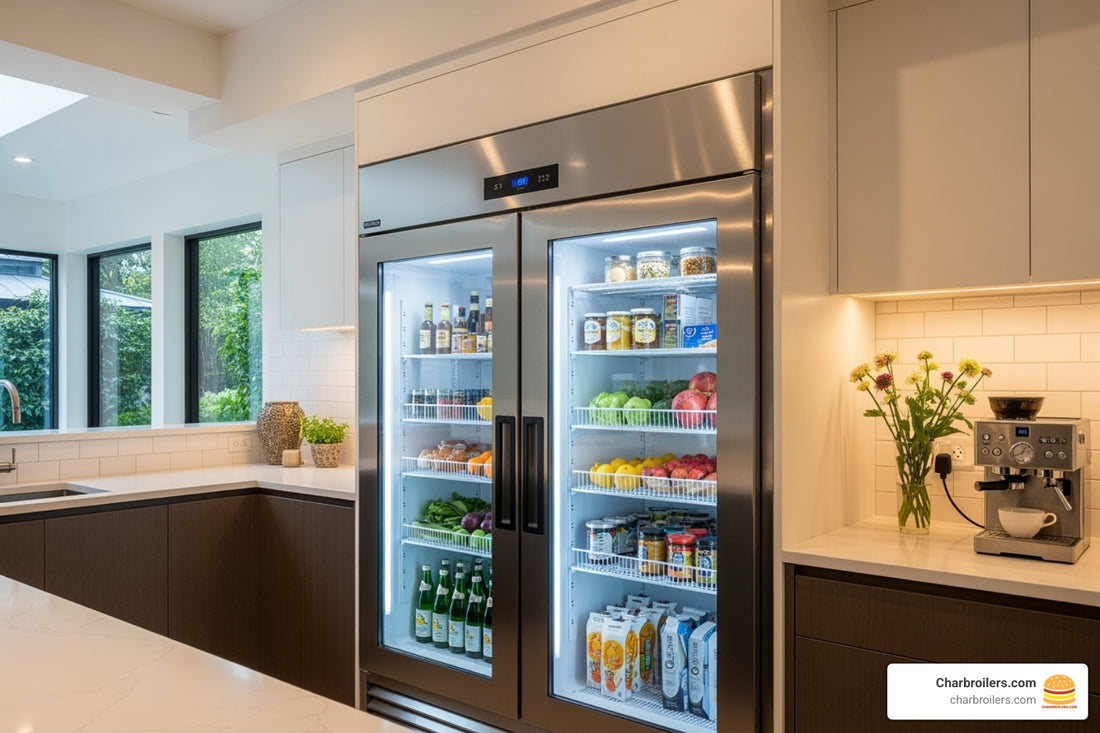
The Homeowner's Guide to Commercial Grade Refrigeration
Share
Why Commercial Refrigeration is Making Its Way Into Home Kitchens
A commercial refrigerator for home use offers massive storage capacity and superior durability, but comes with higher energy costs and noise levels that make it unsuitable for many households.
Key Considerations for Commercial Refrigerators at Home:
- Best For: Large families, frequent entertainers, home-based food businesses
- Storage: 2-3 times more capacity than residential units
- Energy Use: Significantly higher electricity costs (glass doors add minimal extra cost)
- Noise: Considerably louder than home refrigerators
- Location: Ideal for garages, pantries, or separate kitchen areas
- Warranty: Automatically void when used in residential settings
- Cost: Often 1/3 the price of luxury residential brands
More homeowners are finding what restaurant kitchens have known for decades: commercial refrigeration delivers superior storage and rock-solid reliability. As one forum user put it, imagine never again worrying about squeezing an oversized pizza box into a cramped fridge.
I'm Sean Kearney from Charbroilers.com, and with over a decade in the restaurant equipment industry, I've helped countless customers evaluate whether a commercial refrigerator for home use makes sense for their specific needs. My experience has shown that while these units aren't right for everyone, they can be game-changers for the right household.
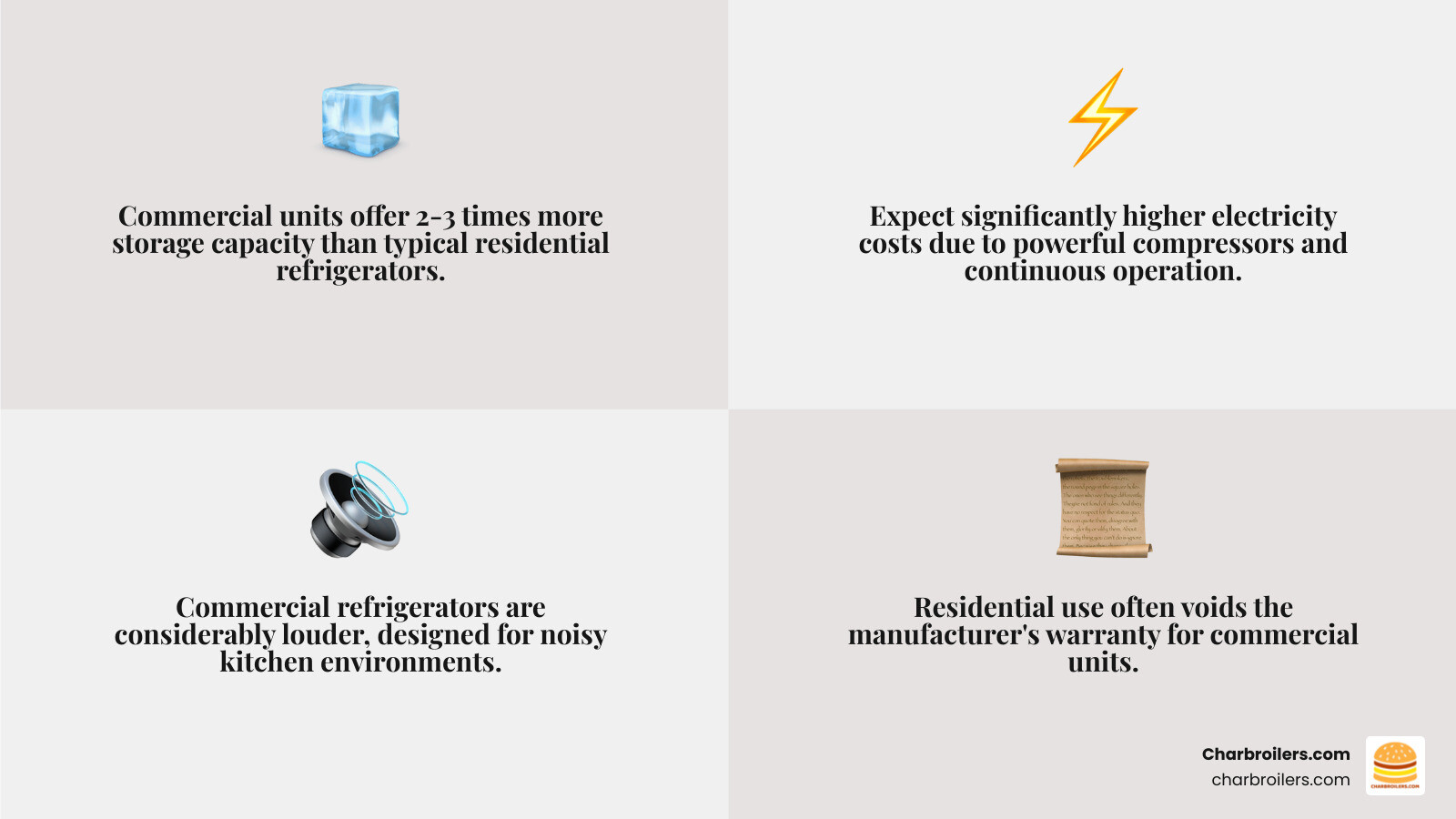
Learn more about commercial refrigerator for home:
The Pros and Cons: Is a Commercial Refrigerator for Home Use Right for You?
Deciding to put a commercial refrigerator for home use in your kitchen isn't an everyday choice. It comes down to understanding your lifestyle and being realistic. If you run a catering business, feed a large family, or buy groceries in bulk, a commercial unit might be your new best friend. But if you value peace and quiet, you might want to reconsider.
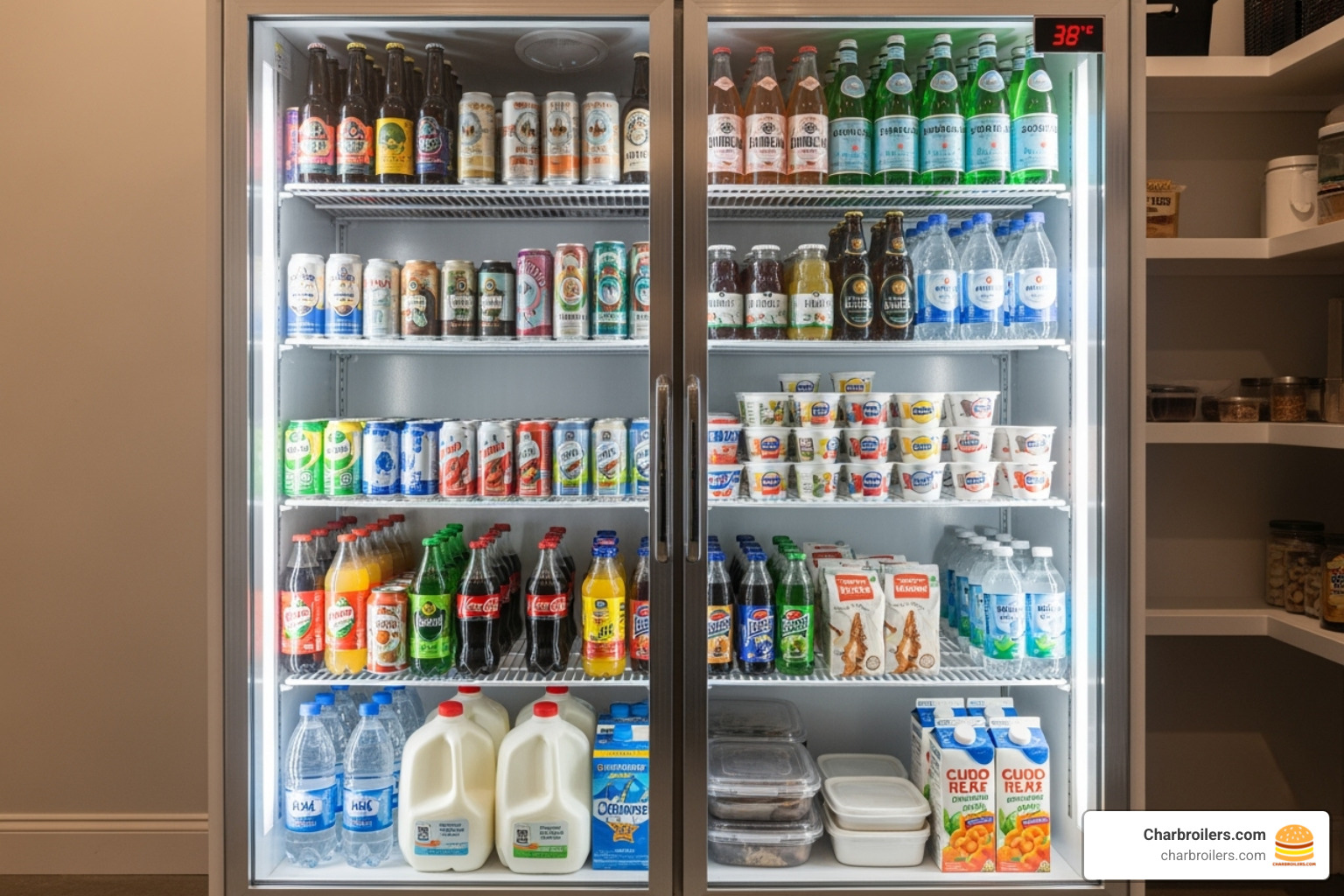
Primary Benefits of a Commercial Refrigerator
Here's where commercial units really shine:
The massive storage capacity is the primary draw. These units offer two to three times the storage of typical home refrigerators, ending the game of grocery Tetris and easily accommodating oversized items.
Superior durability is another key benefit. Built like tanks for the brutal daily grind of restaurant life, their heavy-duty construction with thick steel walls and robust components is meant to last for decades.
The rapid cooling power from powerful compressors chills food much faster than residential models. This isn't just convenient—it's better for food safety.
And let's not forget the commercial kitchen aesthetic. The sleek, stainless steel look says "serious cook" and adds a professional touch to your kitchen.
Want to dive deeper into what makes these units tick? Check out our Detailed Guide to Comparing Commercial Refrigerators.
Potential Drawbacks and Disadvantages
Now for the reality check:
Higher energy consumption is a major drawback. Built for performance over efficiency, their powerful compressors are energy-hungry, leading to a noticeable increase in your electricity bill.
The increased noise levels can be jarring. Designed for noisy restaurant kitchens, the constant hum and compressor cycles are much louder than whisper-quiet residential models.
The lack of organizational features often surprises homeowners. Forget crisper drawers or door bins; these are essentially large, cold boxes with adjustable wire shelving. You'll need to use your own bins and containers for organization.
The larger physical footprint requires significant real estate, including clearance for ventilation. Many units end up in a garage or pantry because they don't fit in a standard kitchen layout.
Finally, there's the higher upfront cost. While often cheaper than luxury residential brands, it's still a significant investment, especially when factoring in potential electrical or space modifications.
The bottom line? A commercial refrigerator for home use can be perfect for the right household, but it's not an impulse buy. Think carefully about whether the benefits align with your actual needs and lifestyle.
Commercial vs. Residential: A Head-to-Head Comparison
Let's be honest – choosing between a commercial refrigerator for home and a traditional residential unit isn't just about picking the bigger one. These appliances come from completely different worlds, designed with entirely different philosophies in mind.
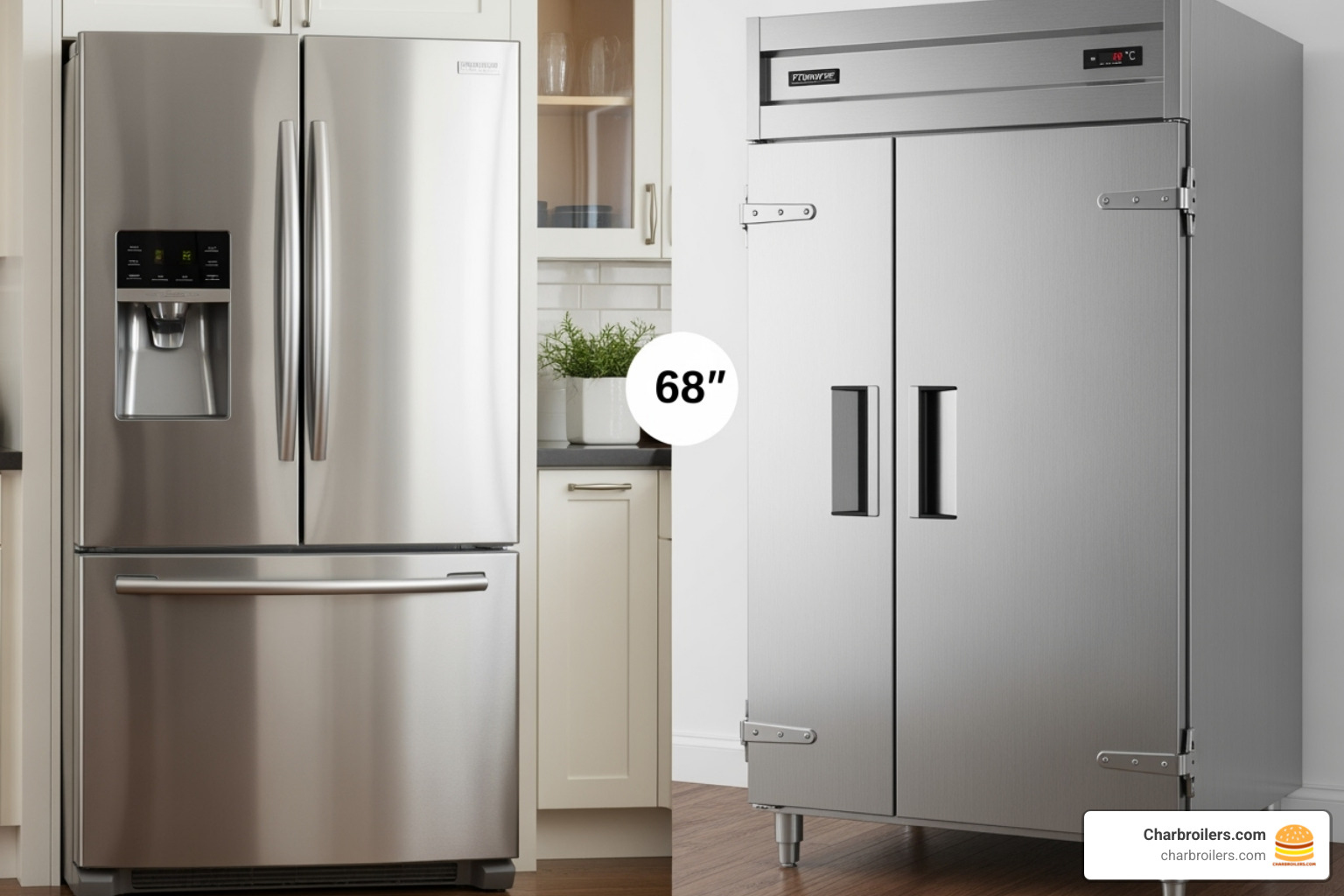
Residential fridges are like family cars: efficient, quiet, and convenient. Commercial units are like delivery trucks: powerful, durable, and built for heavy-duty work.
Energy Consumption and Cost Implications
The energy appetite of a commercial unit is a reality check for many homeowners. Their powerful compressors are engineered to handle constant door openings in a busy restaurant, which shows up on your electricity bill. Expect a significantly higher monthly cost. Glass-door units use slightly more energy than solid-door models, but the real jump is from residential to commercial, regardless of door type.
Let's look at what you might expect annually:
| Refrigerator Type | Estimated Annual Running Cost | Notes |
|---|---|---|
| Standard Residential | $50 - $100 | Energy-efficient, designed for typical home use |
| Solid-Door Commercial | $200 - $500 | Built for continuous operation, larger capacity |
| Glass-Door Commercial | $250 - $550 | Similar to solid-door, slight increase due to glass |
These estimates vary based on model, usage, and local electricity rates.
The initial purchase price is interesting. Commercial refrigerators can cost more than basic residential models, but often far less than luxury brands that can run $4,000-$8,000. A solid commercial unit might cost $1,500-$3,000 for similar capacity.
Maintenance costs require a proactive mindset. Commercial units are designed for regular servicing and cleaning, but they typically avoid the expensive proprietary parts that plague residential units.
Lifespan, Durability, and Maintenance
This is where commercial refrigerators truly shine. They are built for 24/7 operation in demanding environments, engineered to handle the stress of a busy kitchen without breaking a sweat.
The heavy-gauge steel construction and robust mechanics mean fewer delicate components. A commercial unit can weigh 350-400 pounds compared to a 200-250 pound residential fridge, with the extra weight coming from thicker steel, better insulation, and beefier components.
Simpler mechanics also work in your favor, focusing on reliability over fancy features. With fewer electronics and sensors, there are fewer things to go wrong. When repairs are needed, parts are often standard and less expensive.
With proper care, these machines can easily outlast two or three residential refrigerators, with many running strong after 20-30 years. The key is consistent homeowner maintenance, primarily cleaning the condenser coils monthly. This 15-minute task can add years to your refrigerator's life.
For more insights into commercial refrigeration longevity, check out our guide: One Door, Many Benefits: Unpacking Commercial Upright Freezers.
Organizational Features and Interior Layout
The biggest adjustment for most homeowners is the interior. Forget specialized compartments; a commercial refrigerator is like a warehouse. The interior is dominated by adjustable wire shelving—heavy-duty, flexible, and designed for maximum capacity to fit full sheet pans or a massive turkey. But you'll say goodbye to crisper drawers, deli bins, and door storage.
The utilitarian design, essentially a large open box, is for easy cleaning and maximum volume. This means creative organization becomes essential. You'll need to use clear plastic bins as makeshift drawers, stackable containers to maximize vertical space, and shelf dividers to create zones.
The trick is to think like a restaurant: designate shelves for different food categories, label everything, and invest in quality storage containers. Many people find this system more efficient than hunting through multiple small compartments. This trade-off between flexibility and built-in convenience is a key factor in deciding if a commercial refrigerator for home is right for you.
Installation and Safety: What You Need to Know Before You Buy
Installing a commercial refrigerator for home use isn't as simple as wheeling it in and plugging it in. These powerhouse units come with specific requirements, and proper planning is essential to avoid installation headaches or warranty issues.
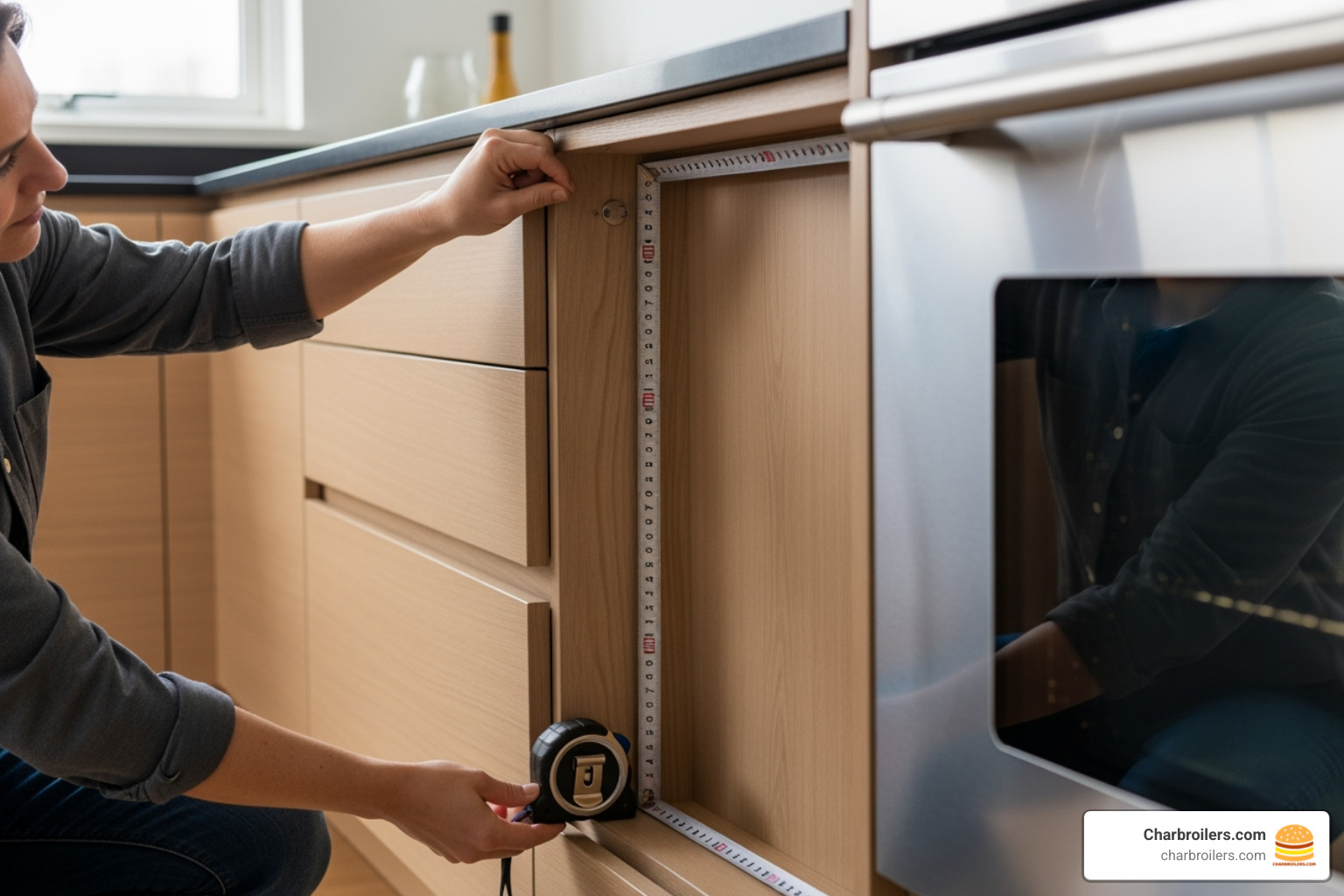
Installation Requirements for a commercial refrigerator for home
Ventilation is absolutely critical. Commercial units generate significant heat, and cramped spaces force the refrigerator to work harder, increasing energy costs and shortening its lifespan. You'll need generous clearance around the back, top, and sides—far more than for a typical residential unit.
Measuring your space is about more than just the final location. Commercial units have specific clearance requirements. One homeowner recently asked about fitting a unit needing 70 3/4" height clearance into a 71" space. As discussed in this helpful thread, minor adjustments like lowering the feet can sometimes make it work, but tight fits are risky.
Weight is a serious consideration. These units are heavy, often weighing significantly more than residential models. Your floor must be able to handle the load, especially on an upper floor or in an older home.
Electrical requirements vary. While smaller units often use standard 110V outlets, larger models may need dedicated circuits or 208/240V connections. Always verify the unit's needs and consult an electrician if you're unsure.
Commercial refrigerators are designed to be freestanding. Attempting to build them into cabinetry without adequate ventilation is a recipe for overheating and premature failure.
Safety, Warranty, and Refrigerant Considerations
These considerations can make or break your investment.
Your warranty will be void. Most manufacturers explicitly state that using commercial appliances in residential settings voids all warranty coverage. When something goes wrong, you are responsible for repair costs. While rare exceptions exist, you should assume you'll have no warranty.
NSF certification matters for quality. Look for units certified to NSF/ANSI Standard 7, which ensures the equipment meets strict public health and safety standards. This certification indicates solid build quality that benefits home users. Our guide on Cool Compliance: Your Guide to NSF/ANSI Standard 7 for Refrigerators and Freezers explains this in more detail.
Refrigerant type can affect long-term ownership. Older units might use obsolete refrigerants (like R22, R12, R134, or R404) that are phased out, making service expensive and parts scarce.
Modern refrigerants like R290 (propane-based) are the new standard. They are efficient, environmentally friendly, and will be serviceable for years. When buying used, always confirm the refrigerant type to avoid a costly mistake.
Choosing Your Unit: Types, Features, and Where to Shop
You've decided a commercial refrigerator for home is right for you. Now comes the fun part: picking the perfect unit. Commercial refrigeration offers more variety than you might expect, but you'll need to know where to look and what to ask.
Types of commercial refrigerators for home use
Different units serve different purposes, and some are more practical for home use.
Glass-door merchandisers are the sleek display fridges you see in delis. They're fantastic for beverage collections or if you love seeing everything at a glance. The glass is slightly less efficient, adding maybe $30-50 per year in energy costs compared to solid doors, but the aesthetic is a major draw. For multi-door options, see our Twice as Nice: Commercial 2-Door Cooler Buying Guide.
Solid-door reach-ins are the workhorses. These stainless steel cabinets are all business, prioritizing maximum insulation, durability, and storage. They offer the most temperature-controlled space for your money, ideal for bulk shoppers or large families.
Undercounter models offer a more subtle approach, sliding neatly under countertops in home bars, outdoor kitchens, or pantries. Some are even rated for outdoor use. They provide commercial-grade cooling without dominating your space.
Freezerless refrigerators can be game-changers. Unlike residential combo units, many commercial models are dedicated to either refrigeration or freezing. If you have a separate freezer, a dedicated commercial refrigerator offers incredible chilled storage capacity.
Where to Find and What to Look For
You won't find these units at your typical big-box store.
Restaurant supply stores are your best starting point. Many have showrooms where you can see the units, feel their build quality, and talk to knowledgeable staff.
Online equipment dealers offer a wider selection, detailed specs, customer reviews, and often better pricing. Stick with reputable dealers who specialize in commercial equipment.
Used equipment auctions and refurbished dealers can offer incredible deals, but require homework. You'll need to investigate the unit's condition, service history, and refrigerant type.
When evaluating any unit, checking for certifications like NSF/ANSI Standard 7 is non-negotiable. This ensures the equipment meets strict safety and sanitation standards.
Finally, verifying dimensions and power requirements is crucial. Measure every doorway, hallway, and turn on the delivery path. Also, double-check the electrical needs, as some larger units require dedicated circuits or higher voltage.
Frequently Asked Questions about Commercial Refrigerators at Home
When homeowners start seriously considering a commercial refrigerator for home use, certain questions come up again and again. I've fielded these concerns countless times over the years, and they're all valid worries that deserve honest answers.
Are commercial refrigerators a lot louder than residential ones?
Yes, they absolutely are. This isn't just a minor difference - commercial refrigerators are considerably louder than what you're used to at home. The culprit? Those powerful compressors and robust condenser fans that make these units so effective.
Think about it: these refrigerators are designed for busy restaurant kitchens where there's already a symphony of sizzling pans, clattering dishes, and shouting chefs. The manufacturers aren't worried about whisper-quiet operation when there's so much background noise already.
This noise level becomes a real issue if you're thinking about placing your unit in an open-plan living space or anywhere near your main living areas. Many homeowners find too late that the constant hum and cycling sounds are simply too intrusive for comfortable daily life.
The smart move? Consider placement in a garage, pantry, or basement where the noise won't drive you crazy. In these locations, that robust commercial sound becomes much more manageable.
Can you put a commercial refrigerator in a garage?
Absolutely yes - and honestly, a garage is often the perfect spot for a commercial refrigerator for home. It's like these units were made for garage placement.
Here's why garages work so well: Commercial refrigerators are built tough and can tolerate temperature fluctuations much better than their residential cousins. While your home fridge might struggle with garage temperature swings, commercial units just keep chugging along.
Plus, that noise issue we just talked about? It's practically a non-issue in the garage. No one's trying to have a quiet conversation or watch TV out there.
Just remember two important things: ensure adequate ventilation around all sides of the unit, and check the manufacturer's specifications for the ambient temperature range. Even tough commercial units have their limits, and you want to make sure your garage stays within the recommended temperature zone for optimal performance.
How much more electricity does a commercial refrigerator use?
Here's where I have to give you the straight truth: significantly more than a residential unit. There's no sugar-coating this one.
The exact amount varies by model - size, age, and features all play a role. Glass doors do reduce efficiency slightly due to poorer insulation, but we're talking about maybe a few tens of dollars difference per year compared to a solid-door commercial unit. The real shock comes when you compare either option to your current home refrigerator.
Commercial units prioritize rapid cooling and temperature recovery over sipping electricity. They're designed for restaurants that open those doors dozens of times per day and need the temperature to bounce back instantly. That performance comes at a cost.
The good news? Some Energy Star commercial models are available, which helps somewhat. But even the most efficient commercial unit will likely cause a noticeable increase in your utility bills. Factor this ongoing cost into your decision-making process - it's not just about the upfront purchase price.
Conclusion
After weighing all the pros and cons, the question becomes clear: is a commercial refrigerator for home use right for your specific situation? The answer depends entirely on your household's unique needs and tolerance for certain trade-offs.
These robust units shine brightest in homes where storage capacity truly matters. If you're constantly playing refrigerator Tetris with your groceries, hosting large gatherings regularly, or running a home-based food business, the massive storage space and rock-solid reliability can be transformative. The superior durability means you're likely buying your last refrigerator for decades to come.
However, the drawbacks are real and shouldn't be overlooked. The significantly higher energy consumption will show up on your utility bills every month. The increased noise levels make them unsuitable for open-concept living spaces or quiet kitchens. And the utilitarian interior means saying goodbye to those convenient crisper drawers and door bins you've grown accustomed to.
The ideal homeowner profile for a commercial refrigerator for home includes large families who buy groceries in bulk, frequent entertainers who need space for party supplies and beverages, avid home cooks who appreciate professional-grade performance, and home-based food businesses where commercial storage isn't just nice to have—it's essential.
For these households, the investment often pays dividends in convenience, reliability, and sheer capacity. Just remember to plan carefully for installation requirements, understand that warranties are automatically void in residential settings, and commit to monthly condenser coil cleaning for optimal performance.
At Charbroilers.com, we've spent over a decade helping customers understand commercial kitchen equipment, whether for busy restaurants or dedicated home setups. The same principles that make commercial refrigeration essential in professional kitchens can transform the right home kitchen too.
For more insights into commercial refrigeration options, explore our Commercial Refrigeration Equipment Explained: No Sweat!. And for a complete overview of professional kitchen equipment, explore our guide to commercial charbroilers for your restaurant.
